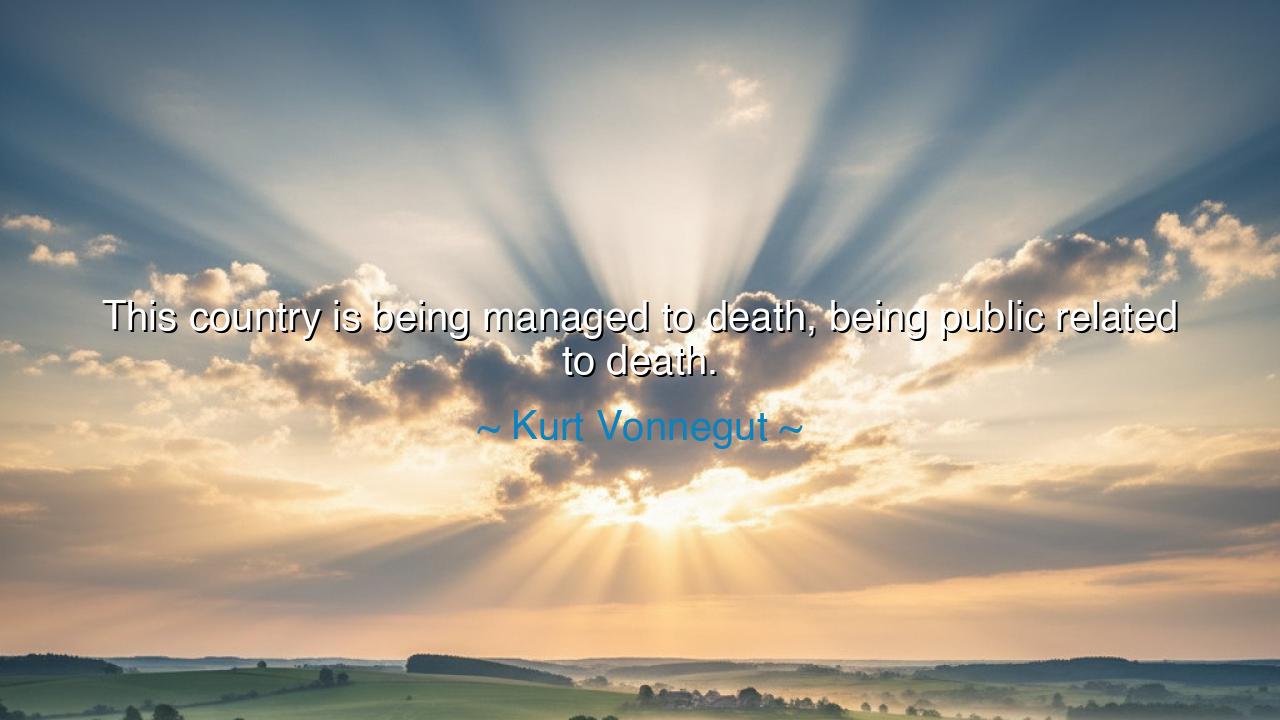
This country is being managed to death, being public related to






In the councils of civic memory, hear Kurt Vonnegut sound a warning like a bell at dusk: “This country is being managed to death, being public related to death.” The cadence is blunt, almost clumsy on purpose, as if to show us how slogans and spreadsheets can strangle breath. By “managed to death,” he names the tyranny of metrics without meaning, process without purpose, meetings instead of mercy. By “public related to death,” he points at the priesthood of public relations—spin that embalms problems rather than heals them—until a nation mistakes image for reality, and the real patient quietly declines. The line is a doctor’s chart: diagnosis first, then a hard prescription.
The meaning is double. First, Vonnegut warns that management untethered from human ends turns into bureaucracy—forms for the sake of forms, memos in quintuplicate, risk disguised as “best practice.” He had skewered such systems all his life, from the factory dystopia of Player Piano to essays that flayed corporate euphemism; he even lampooned public relations in that early novel, defining it as the manufacture of favorable opinion with stability—not truth—as the highest good. Second, he argues that PR’s quiet art can become a shroud: language softens the edges of suffering until there is nothing sharp enough left to cut away the rot. When metrics rule and spin smooths, the body politic is “managed” and “public-related” toward stillness—the stillness of a grave.
As to origin, the sentence appears in widely circulated quotation anthologies and databases; they attribute it to Vonnegut but do not tie it to a single page or speech. While the exact first appearance is elusive, the thought fits his public stance near the end of his life: a satirist of American technocracy who had actually worked in corporate public relations before turning full-time to fiction. In other words, the line is consistent with the witness of his career—an insider who escaped the factory and kept sounding the alarm.
Set the saying beside his broader critique. In interviews and late essays he lamented a nation drowning in euphemism, sold to itself by professionals who could “shape the narrative” while the facts stayed stubborn. His satire did not reject organization, planning, or persuasion as such; it condemned their severance from public virtue. When the purpose of management becomes preservation of management, and the purpose of public relations becomes protection of the powerful, the common good is left to fend for itself. Then bridges crumble prettily, schools are “rebranded” instead of repaired, and citizens are fed stories as though stories were bread.
A story makes the warning plain. Imagine a city facing a water crisis. The dashboards glow green; targets are “met”; a campaign assures residents their water is “within guidelines.” Yet children keep coughing, and pipes keep failing. Meetings multiply; statements are crafted; “stakeholders” are “engaged.” What’s missing is the unglamorous act of replacing the pipe. The city is not murdered by malice so much as smothered by process and perfumed by PR—managed and public-related toward ruin. Vonnegut’s line is for such hours: tear the gauze away; call a spade a spade; pick up the wrench.
History offers a sterner mirror. Consider wars sold with slogans, market manias narrated as “innovations,” catastrophes softened by talking points while the fix is postponed. Again and again, detached management and anesthetic public relations have lulled publics into accepting harm as normal. Vonnegut’s art—like Twain’s before him—tries to jolt the sleeper: laugh first, then wake, then work. Satire is the rude alarm of a friend who loves you enough to be loud.
What, then, is the lesson? First, demand purposes before procedures: ask of any plan, “Whom does this help, and how soon?” Second, measure what matters: track repaired bridges, healthier kids, cleaner water—not press hits or meeting minutes. Third, refuse euphemism: name failures plainly so remedies can be chosen promptly. Fourth, treat public relations as a servant to truth, not its substitute: if the facts are bad, fix the facts before polishing the story. These are small civic habits that keep a society alive, breathing, and honest.
Finally, carry the cadence like a pocket rule: managed to death, public related to death. Let it test your office, your school board, your company, your town. When you feel the creep of process for process’s sake—or the sweet fog of spin—reach for Vonnegut’s flint. Strike it. Make sparks that light the work that really saves: clear speech, swift repair, tender regard for the human being who stands on the other end of every policy. That, in the end, is management worthy of the name—and a public relation that relates the public to the truth.






AAdministratorAdministrator
Welcome, honored guests. Please leave a comment, we will respond soon